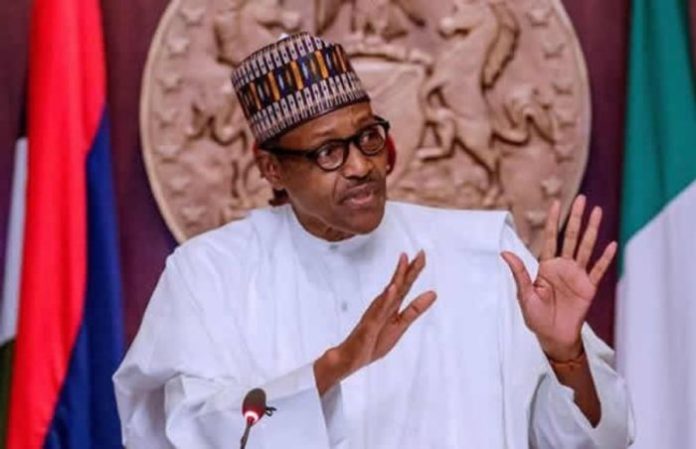
Budget Deficit Rises To N20.64trn Under Buhari
Budget deficit has risen to N20.64tn under president Muhammadu Buhari, according to analysed data from the budget office.
The data covered periods from 2016 to 2020.
According to the budget office, more than N7.97tn was borrowed from foreign and domestic sources to fund these deficits.
According to Investopedia, a budget deficit occurs when expenses exceed revenue and indicate the financial health of a country.
The budget office said the Federal Government generated a revenue of N3.42tn to fund the budget in 2020.
It said total government spending for the year was N10.02tn, 0.43 per cent above the N9.97tn budgeted.
Hence, the budget deficit for the year was N6.59tn (14.17 per cent of the 2020 GDP), and this was partly financed through domestic borrowing of N2.06tn.
In 2019, the Federal Government generated a total of N4.12tn to fund the budget. For the year, total expenditure was N8.29tn, a decrease of N618.14bn (6.93 per cent) from the annual projection.
Budget deficit stood at N4.18tn (2.9 per cent of 2019’s GDP), and was partly financed through domestic borrowing of N912.82bn.
In 2018, a total of N3.48tn, excluding other funding sources, was generated in revenue to fund the year’s budget.
For the year, total spending was N7.51tn, a decrease of N1.61tn from the budget. This meant a budget deficit of N3.65tn (2.85 per cent of the 2018 GDP), which was financed to the tune of N2.50tn through foreign borrowing of N1.17tn and domestic borrowing of N1.34tn.
According to the budget office, the implementation of the 2017 budget was affected by poor revenue outturn as oil production and exports remained below the budget estimates while the performance of the economy continued to impact negatively on non-oil revenue.
The office said a total of N2.38tn revenue, excluding other funding sources, was generated to fund the budget in 2017.
It added that actual expenditure in 2017 was N6.46tn, a N977.57bn decrease from the annual projection.
This left a budget deficit of N3.81tn, which was financed to the tune of N2.50tn, comprising of N1.17tn and N1.34tn of external and domestic borrowings respectively.
In 2016, the Federal Government generated a revenue of N2.95tn to fund the budget. For the year, total government spending was N5.36tn, an expenditure shortfall of N700bn of the budget estimate of N6.06tn for the period.
Budget deficit was N2.41tn (2.37 per cent of GDP) or 45 per cent of total expenditure.
For the period under review, N7.76tn was released for the implementation of capital projects and programmes of MDAs for the years under review.
In descending order, N1.95tn was released in 2020, N1.17tn was released in 2019, N1.86tn was released in 2018, N1.56tn was released in 2017, and N1.22tn was released in 2016.
In her budget presentation for 2015, then Coordinating Minister for the Economy and Minister of Finance, Dr Ngozi Okonjo-Iweala, disclosed that the budget deficit for the year was going to be N755bn (or 0.79 per cent of GDP).
She added that the budget deficit for 2014 was N994bn (or 1.24 per cent of GDP).
According to her, there was a need to keep the deficit under three per cent of GDP because of the Fiscal Responsibility Act, 2007 and in accordance with the international norm.
Recently, the Minister of Finance, Budget and National Planning, Mrs Zainab Ahmed, disclosed that the Federal Government was going to borrow to fund its N6.25tn deficit in the proposed 2022 budget.
She said, “If we just depend on the revenues that we get, even though our revenues have increased, the operational expenditure of the government, including salaries and other overheads, is barely covered or swallowed up by the revenue.
“So, we need to borrow to be able to build these projects that will ensure that we’re able to develop on a sustainable basis.
“Nigeria’s borrowing has been of great concern and has elicited a lot of discussions. But if you look at the total size of the borrowing, it is still within healthy and sustainable limits. As of July 2021, the total borrowing is 23 per cent of GDP.”
Echoing the words of his minister, President Muhammadu Buhari while presenting the 2022 budget to the joint session of the National Assembly, said his government planned to borrow as much as N5tn from local and foreign sources to cover the budget deficit for 2022.
He said, “We plan to finance the deficit mainly by new borrowings totalling N5.01tn; N90.73bn from privatisation proceeds and N1.16tn drawdowns on loans secured for specific development projects.”
The President of the Senate, Ahmad Lawan, had at the joint session of National Assembly for the budget raised concern about the rising spate of borrowing.
He had said, “Mr President, the need to enhance revenue generation and collection cannot be overemphasised.
“The level of budget deficit is high, and both the legislature and the executive should work to reduce this deficit through the availability of more revenues.”
Lawan added that the government should consider other sources of funding its projects in order to reduce borrowing.
In a recent interview the Chief Executive Officer of Financial Derivatives Company, Bismarck Rewane, said the only way to finance a deficit was by borrowing.
In April 2021, the Edo State government accused the FG of printing money indiscriminately to be able to meet up with some of its obligations.
A report in August showed that the Federal Government’s total borrowing from the Central Bank of Nigeria through Ways and Means Advances had ballooned to N15.51tn under Buhari.
Ways and Means Advances is a loan facility used by the central bank to finance the government in periods of temporary budget shortfalls subject to limits imposed by law.
According to Section 38 of the CBN Act, 2007, the bank may grant temporary advances to the Federal Government in respect of temporary deficiency of budget revenue at such rate of interest as the bank may determine.
While the FG has borrowed N7.97tn from domestic and foreign sources to finance its N20.64tn budget deficit in the period under review, the shortfall of about N12.67tn may have been financed by the CBN.
In June, London-based Capital Economics, in a report titled ‘The perils of deficit monetisation in Nigeria’ disclosed that the FG had been turning to the CBN to plug its budget deficits.
They added that this move would deepen some of Nigeria’s existing economic woes, including high inflation, downward pressure on the naira and weak economic growth.
The organisation said, “The authorities in Nigeria have routinely relied on the Central Bank of Nigeria to help finance budget deficits in recent years.
“This was the case even before the onset of the pandemic and has also occurred irrespective of whether the budget shortfall was in line with official projections or not – Nigeria has a pretty poor track record of sticking to its budget plans.”
It added that over the past six years, on average, around 55 per cent of annual budget shortfalls had been financed by the CBN.

































